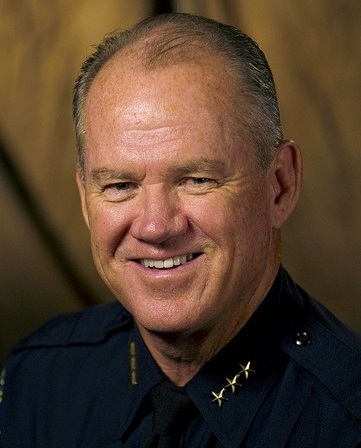
A/CHIEF JOHN A. WELTER
04/15/2003 - 08/25/2003
When David Bejarano accepted the job as US Marshal for the Southern District, the department was left in the hands of his second in command, Executive Assistant Chief John Welter. He would quickly find the job more challenging than perhaps almost any chief before him.
Police work had been a longtime family tradition for John Welter. Both his father and uncle served the SDPD as motorcycle officers before John pinned on a badge and followed in their footsteps.
Welter took office as Acting Chief on April 15, 2003. There would be no honeymoon as just a few hours later Welter was summoned to a hospital trauma unit where Officer Gerald Griffin’s life hung in the balance after being stuck by a car in Pacific Beach.
Griffin passed away from his injuries ten days later.
If that wasn’t enough, Welter also found himself grappling with one of the most difficult budget situations since the 1930’s.
With the city already running on a patchwork budget that covered a 20 million dollar deficit, and the state threatening to take millions more, it became almost a weekly occurrence for Welter to tell City Manager Michael Uberaga that there was no way he could run the police department on the money the city was giving him.
As he was telling the Manager he needed more resources, Welter knew in the back of his mind he was telling this to the same person would be interviewing him for the permanent chief’s position.
Even with the stress of budget battles, Welter wanted to be more visible to both the public and his officers. To do that he decided to put on his uniform and go back in the street. Realizing that as chief he could easily give himself any assignment he wanted, Welter nonetheless risked injury to himself and his ego when he enrolled in the grueling two-week motor officer academy. Telling the instructors he didn’t want special favors, Welter worked alongside regular motorcycle officer candidates to complete the academy. He then set out patrolling the city.
Some officers had no idea Welter was back in uniform and were astonished to see the chief at radio calls or making traffic stops. Nonetheless reaction was overwhelmingly positive. “This shows he is one of us,” several officers said.
As Welter went about his job he was also applying for the position as chief. Little did he know that as he was sizing up the competition of candidates from across the US, tragedy was looming just around the corner. On June 26th motorcycle officer Terry Bennett was deliberately run over by an auto theft suspect. The murder of Officer Bennett marked the shortest time between officer deaths (other than the same incident) that the department had ever experienced. Unfortunately for Welter it also marked the earliest in any chiefs tenure that he had to deal with a line of duty death. Like some of the chiefs before him, Welter found himself trying to explain to family members how a loved one was taken from them far beyond their time.
Towards the middle of July rumors began to swirl throughout the department that the new chief could be an outsider. The rumor was given more life when Welter himself began to tell the command staff he didn’t think he got the job. Many line officers were in disbelief that it was even possible to consider an outsider given that all chiefs since 1940 had been promoted through the ranks. Nonetheless, on July 24th City Manager Uberaga announced his selection San Diego’s top cop was San Jose Police Chief William Lansdowne.
Line officers opinion of the selection process ranged from outrage to acceptance. Some commented, “you bring in outsiders when there’s scandal and corruption. We had none of that.” Others felt Welter deserved the job and was treated unfairly. Many more officers though felt the new chief deserved a chance and promised to keep an open mind.
Welter took the news of not getting the job with dignity and quickly promised to help Lansdowne get on his feet and acclimated to a new police department and a new city. Welter also promised Lansdowne that if he did seek a new job, he would tell him first - Lansdowne would not read about it in the newspaper. Welter also asked that he not be tied down behind a desk for the remaining two years of his career.
John Welter officially left office of interim chief on August 26, 2003, and went back to second in command where he would be responsible for running the day to day operations of the police department.
Looking back on his time in office Welter reflected that when he came on the police department more than 30 years before, his only goal was to be a motor cop. It wasn’t until 1978 when a captain talked him into making rank that he considered anything else. Welter said his father once told him, “one day you will be chief.” Welter didn’t believe him at the time and his father only lived to see him make Captain.
Asked where he saw the police department in 100 years Welter replied, “I see us being on the cutting edge of technology and still an innovator - much as we are today.”
John Welter retired from the San Diego Police Department in 2004 to become the chief of the Anaheim Police Department. He retired in 2013

